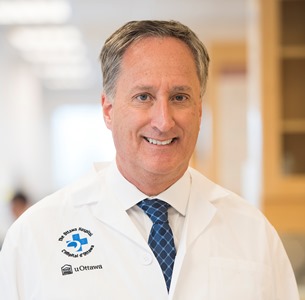 “Most treatments for kidney disease haven’t changed in 30 years. Only through research can we improve what we offer our patients.” -Dr. Kevin BurnsAs a young man raised in Montreal, Dr. Kevin Burns had no intention of staying in Ottawa when he first came here to study nephrology as a medical resident. However, he grew to love both the city and his colleagues at The Ottawa Hospital and has since worked tirelessly to expand kidney research locally and nationally.
“Most treatments for kidney disease haven’t changed in 30 years. Only through research can we improve what we offer our patients.” -Dr. Kevin BurnsAs a young man raised in Montreal, Dr. Kevin Burns had no intention of staying in Ottawa when he first came here to study nephrology as a medical resident. However, he grew to love both the city and his colleagues at The Ottawa Hospital and has since worked tirelessly to expand kidney research locally and nationally.
“Most treatments for kidney disease haven’t changed in 30 years,” said Dr. Burns. “Only through research can we improve what we offer our patients.”
Dr. Burns particularly wants to help people with acute kidney injury, which impacts one in five patients in the ICU. The kidneys are often the first organ to shut down during critical illness, and there’s no guarantee they’ll start up again.
In the lab, Dr. Burns and his team were the first to discover that tiny bits of cell called exosomes released by human umbilical cord blood cells can protect the kidney from this injury. The healing power in these exosomes comes from micro-RNA-486-5p, a tiny piece of RNA that helps with healing and repair.
Dr. Burns’ team found that injecting this microRNA into mice could completely prevent kidney injury, a therapy they hope to test soon in human trials.
Dr. Burns is also a world-renowned expert in the renin-angiotensin aldosterone system (RAAS). This complex hormone system regulates blood pressure, and the kidneys hold center stage. Dr. Burns played a major role in understanding how this system contributes to kidney and cardiovascular disease. This led to national collaborations to investigate RAAS changes in people with type 1 and type 2 diabetes, and more recently in people with heart failure and COVID-19.
“Being a clinician and a basic scientist is almost like having two different jobs, and that can be tough to balance,” says Dr. Burns. “But I love both aspects, so I don’t want to give one up.”
Revving Canada’s kidney research engine
Early in his career, Dr. Burns realized that Canada had a problem – it didn’t have enough kidney researchers.
“Kidney research can be a bit neglected, despite the enormous social and economic costs of these chronic diseases which are only increasing as the population ages,” said Dr. Burns.
To grow the country’s kidney research community, Dr. Burns worked with the Kidney Foundation of Canada, the Canadian Society of Nephrology, and the Canadian Institutes of Health Research to establish a national research training program in nephrology. After five years of negotiations, he helped launch the Kidney Research Scientist Core Education and National Training (KRESCENT) program, which he directed for nearly 15 years.
This training program had a profound impact on kidney research in Canada, and the more than 80 graduates of the program owe the success of their early careers to Dr. Burns’ vision, leadership, and support. Many have become leaders themselves in academia, industry, and not-for-profits.
“I’m very interested in training the next generation of scientists,” said Dr. Burns. “This training program brought our community together, and I'm very encouraged for the future of kidney research in Canada.”
A Canadian-first research centre
Closer to home, Dr. Burns was a major force in developing The Ottawa Hospital’s kidney research program. This included founding the Kidney Research Centre in 2000, Canada’s first research facility exclusively devoted to kidney disease. In over 20 years as Director of this centre Dr. Burns has overseen the tremendous expansion of fundamental and clinical kidney research at the hospital.
After many years of impressive research accomplishments, including 170 publications, Dr. Burns is convinced focusing on the kidney was the right choice.
“Kidney diseases affect every part of the body, so you need to know a lot about how the body works and the mechanisms behind it. There’s never a dull moment in nephrology.”
Check out this Q&A to learn more about Dr. Burns and what inspires him.
The Ottawa Hospital is a leading academic health, research and learning hospital proudly affiliated with the University of Ottawa and supported by The Ottawa Hospital Foundation.
